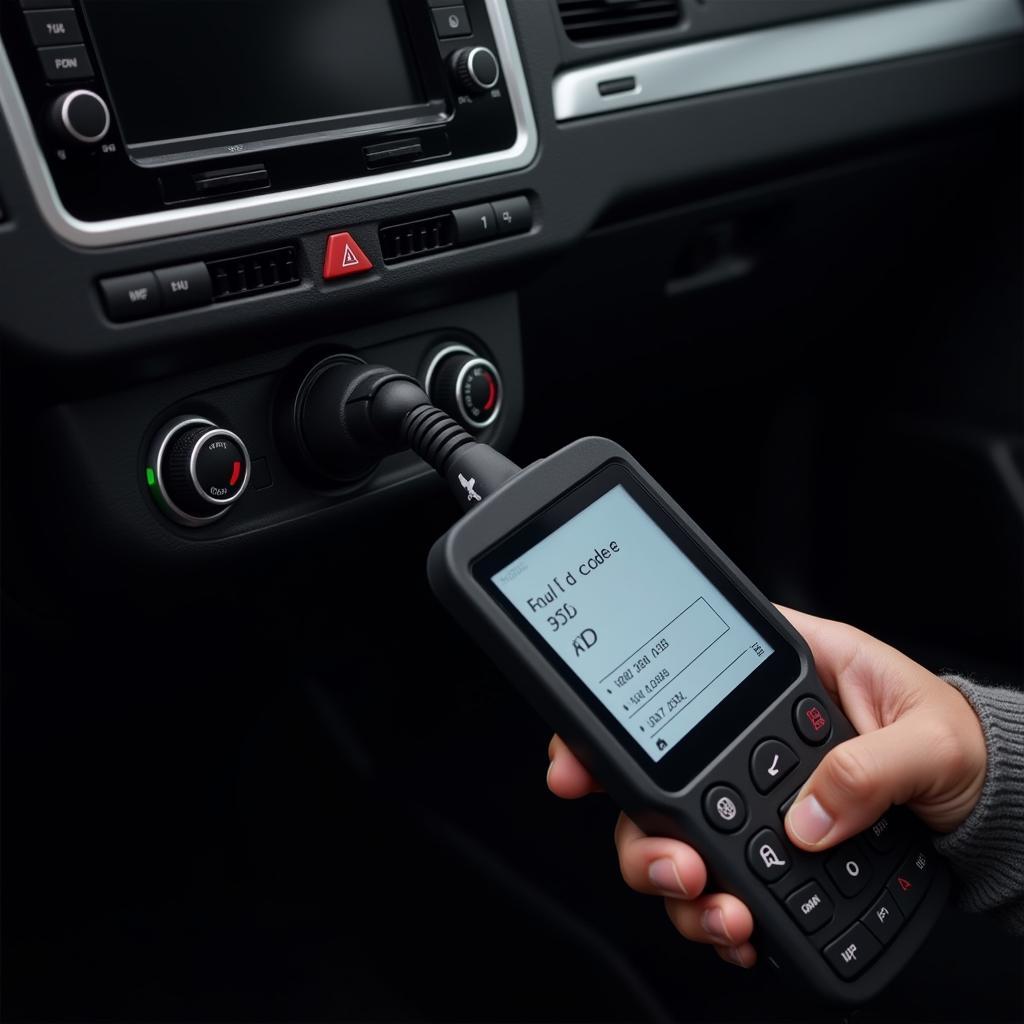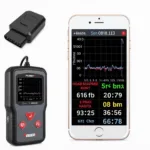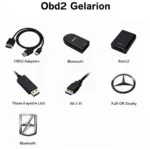Understanding your car’s internal communication system can be daunting, but it doesn’t have to be a mystery. When your Volkswagen displays a warning light, it’s essentially communicating through a specific set of codes called OBD2 fault codes. These codes are crucial for identifying issues and getting your car back on track.
OBD2 stands for On-Board Diagnostics, a standardized system used in all vehicles manufactured after 1996. When a problem is detected, the OBD2 system stores a specific code in the car’s computer, which can be retrieved using an OBD2 scanner.
Decoding Volkswagen OBD2 Fault Codes
Volkswagen OBD2 fault codes follow a specific format, each character representing a piece of the puzzle. For example, a code like “P0171” can tell you a lot about the issue:
- P: This indicates a powertrain-related code, usually related to the engine or transmission.
- 0: This number indicates a standardized code defined by the Society of Automotive Engineers (SAE).
- 1: Represents the specific system affected. In this case, “1” refers to the fuel and air metering system.
- 71: This two-digit number identifies the specific fault within the fuel and air metering system. In this instance, “71” indicates a lean fuel mixture.
Common Volkswagen OBD2 Fault Codes
While numerous OBD2 codes exist, some frequently appear in Volkswagen vehicles:
-
P0420: Catalyst System Efficiency Below Threshold (Bank 1). This code usually indicates a failing catalytic converter, a critical component of the vehicle’s emissions system.
-
P0171: System Too Lean (Bank 1). This code suggests that the engine is running on a lean fuel mixture, meaning there is too much air compared to fuel.
-
P0300: Random/Multiple Cylinder Misfire Detected. This code indicates that one or more cylinders in the engine are not firing correctly, potentially leading to reduced performance and fuel economy.
-
P0138: O2 Sensor Circuit High Voltage (Bank 1, Sensor 2). This code points to a problem with the oxygen sensor, responsible for monitoring the exhaust gases and adjusting the air-fuel mixture for optimal combustion.
What Causes OBD2 Fault Codes in Volkswagens?
Various factors, ranging from minor glitches to significant mechanical problems, can trigger OBD2 codes in Volkswagen vehicles. Some common culprits include:
-
Faulty Oxygen Sensors: Oxygen sensors play a crucial role in maintaining the correct air-fuel ratio in the engine. When they fail, they can send inaccurate readings to the car’s computer, triggering various fault codes.
-
Worn Spark Plugs: Worn or damaged spark plugs can cause misfires in the engine, leading to reduced performance and potentially triggering codes like P0300.
-
Vacuum Leaks: Leaks in the intake manifold or other vacuum hoses can disrupt the engine’s air intake, resulting in a lean fuel mixture and triggering codes like P0171.
-
Faulty Catalytic Converter: A clogged or failing catalytic converter can restrict the flow of exhaust gases, reducing engine performance and triggering codes related to the emissions system, such as P0420.
-
Malfunctioning Mass Air Flow (MAF) Sensor: The MAF sensor measures the amount of air entering the engine. If it fails, it can provide incorrect readings to the ECU, impacting fuel economy and potentially triggering various fault codes.
What to Do When Your Volkswagen Displays a Warning Light
When a warning light illuminates on your Volkswagen’s dashboard, it’s essential to address the issue promptly. While some codes might indicate minor issues, others could point towards more serious problems requiring immediate attention.
Here’s what you can do:
-
Note the Warning Light: Observe the specific warning light illuminated on the dashboard. Is it the check engine light, ABS light, or another warning indicator?
-
Retrieve the Fault Code: Use an OBD2 scanner to retrieve the specific fault code stored in the car’s computer. This code provides valuable insight into the nature of the problem.
-
Research the Code: Once you have the code, research its meaning to understand what system or component it relates to. Numerous online resources can help you decipher OBD2 codes.
-
Diagnose the Issue: Based on the code and your research, begin diagnosing the problem. This might involve inspecting specific components, checking for vacuum leaks, or testing sensors.
-
Repair or Seek Professional Help: If you’re comfortable with car repair, you can attempt to fix the issue yourself. However, for more complex problems or if you’re unsure, it’s best to seek professional help from a qualified mechanic.
Expert Insights
“Regularly scanning your Volkswagen for OBD2 codes can help you stay ahead of potential problems,” says John Miller, a seasoned automotive engineer at OBDFree. “Early detection often translates to less expensive repairs and ensures your Volkswagen stays on the road longer.”
Conclusion
Understanding Volkswagen OBD2 fault codes is crucial for every Volkswagen owner. By familiarizing yourself with common codes and their meanings, you can better understand your car’s health and address potential issues promptly. Remember, a well-maintained car performs better, lasts longer, and provides a smoother driving experience.
FAQs
1. What is the difference between a check engine light and other warning lights?
The check engine light specifically indicates a problem with the engine or emissions system, while other warning lights signal issues with different systems like ABS, airbags, or tire pressure.
2. Can I drive my Volkswagen with the check engine light on?
While you might be able to drive short distances with the check engine light on, it’s crucial to have the issue diagnosed and repaired as soon as possible to prevent further damage.
3. How often should I scan my Volkswagen for OBD2 codes?
It’s recommended to scan your Volkswagen for OBD2 codes at least once a year or whenever you notice unusual performance or warning lights.
4. Where can I get my Volkswagen diagnosed and repaired?
You can take your Volkswagen to a trusted mechanic, dealership, or specialized repair shop experienced in diagnosing and repairing Volkswagen vehicles.
5. How much does it cost to fix an OBD2 code?
The cost of fixing an OBD2 code can vary significantly depending on the specific code, the underlying problem, and labor costs.
Need more help with your Volkswagen OBD2 fault codes?
Contact us via WhatsApp at +1(641)206-8880 or Email: [email protected]. Our 24/7 customer support team is here to assist you!


